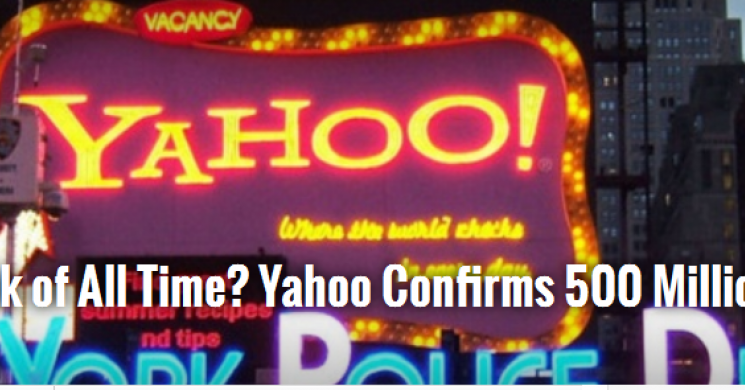
Yahoo Confirms it Was Hacked in 2014
Largest Hack of All Time Not disclosed for Two Years
submitted by Josie Wales and AntiMedia . Yahoo has confirmed rumors of a data breach compromising the account information of “at least 500 million user[s]” in what appears to be the largest hack of all time, surpassing the Myspace hack of 2013. Tech site Recode first reported the hack Thursday morning after being tipped off by “several sources close to the situation.” They predicted an official announcement from the company would be released sometime this week.
What You Can Do to Protect Yourself NOW
by Soren K and Vince Lanci
The hack of Yahoo, one of the internet's busiest sites, with more than one billion users, has many wondering what they can do to protect themselves and secure their accounts and information. And remember, they were hacked 2 years ago and just telling us now. You cannot rely on corporate accountability, or Government regulations to protect you. Protect yourself now.
- Check to see how secure your password is- WE DID
- Use How Secure Is My Password to check
- Use 2-Step verification on your Google accounts WE DO
- adds another layer of verification and is becoming the industry standard
- Use a password manager WE DO after our programmer explained why it's safer this way.
- these keep all passwords in one place
- you need a password to access it
- some products create uncrackable passwords for each account you use it for
- and then when you log in, their product interfaces with the login screen
- All you have to do is simply remember a master password. You don't even have to type in a password when you want to log in. Simply log into your websites seamlessly with a single click.
- They remind you to change passwords
- Colleagues recommend and use LastPass and 1Password
- Use a unique password for all your important accounts.
- Use a long password with a mix of letters, numbers, and symbols
General Password Advice
- Change your passwords now. Change your password often; never use the same password twice. Avoid using common passwords and combinations; pick something unique or meaningful to you.
- Change your security questions and answers frequently.
- Try using a password manager to keep track of your personal passwords and how long it's been since you last changed them.
- If a site offers additional security features beyond a password, activate those features. Many banks sites and sites like Google and Apple, offer two-step security.
- Monitor all of your sites carefully and regularly; look for anything that looks or seems out of character for you. Alert your friends to be aware of anything that seems unusual from you that may cross their path.
If you think your account has been hacked, notify all of the sites you use, including banks and credit card companies, immediately.
Be careful- SK
The statement, posted at 2:28 EST Thursday, speculates the information was stolen by a “state-sponsored actor,” a term used to describe an unidentified person or entity working on behalf of a government to allegedly “gain information about their targets, or access to their targets through trusted relationships with the third party company.” Yahoo’s claim has not been confirmed, but an investigation is underway.
According to their press release:
“A recent investigation by Yahoo! Inc. (NASDAQ:YHOO) has confirmed that a copy of certain user account information was stolen from the company’s network in late 2014 by what it believes is a state-sponsored actor. The account information may have included names, email addresses, telephone numbers, dates of birth, hashed passwords (the vast majority with bcrypt) and, in some cases, encrypted or unencrypted security questions and answers. The ongoing investigation suggests that stolen information did not include unprotected passwords, payment card data, or bank account information; payment card data and bank account information are not stored in the system that the investigation has found to be affected. Based on the ongoing investigation, Yahoo believes that information associated with at least 500 million user accounts was stolen and the investigation has found no evidence that the state-sponsored actor is currently in Yahoo’s network. Yahoo is working closely with law enforcement on this matter.”
It goes on to encourage users to “review their online accounts for suspicious activity and to change their password and security questions and answers for any other accounts on which they use the same or similar information used for their Yahoo account.”
“Additionally, Yahoo asks users to consider using Yahoo Account Key, a simple authentication tool that eliminates the need to use a password altogether.”
Yahoo again stresses the perceived threat of “state-sponsored actors.” As it continues:
“Online intrusions and thefts by state-sponsored actors have become increasingly common across the technology industry. Yahoo and other companies have launched programs to detect and notify users when a company strongly suspects that a state-sponsored actor has targeted an account. Since the inception of Yahoo’s program in December 2015, independent of the recent investigation, approximately 10,000 users have received such a notice.”
Verizon, which is set to purchase the internet company in a $4.8 billion deal, also released a statement this afternoon in which they claimed they were not notified of the scope of the breach until just two days ago.
While the culprit has not yet been identified, Motherboard reported in August that “the hacker known as Peace, who has previously sold dumps of Myspace and LinkedIn, listed supposed credentials of Yahoo users on The Real Deal marketplace. Peace told Motherboard that he has been trading the data privately for some time, but only now decided to sell it openly.”
Peace has not yet commented on Yahoo’s confirmation of the breach.
Yahoo did not immediately respond to a request for comment.
Read more by Soren K.Group

